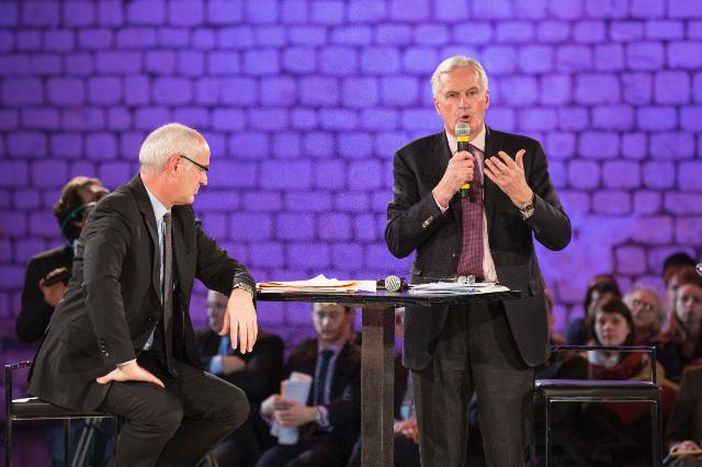
EUROPEAN ELECTIONS: IS TIME RUNNING OUT ?
Published on
Translation by:
Abigail WatsonWith three months to go until the European Elections, both governement and Commision are still hoping to mobilise the French. Their aim is to combat the rise of the far-right National Front party (FN). Is the battle already lost?
At first glance it may have been mistaken for a TV chat show: a large room plunged into darkness, a host standing on a central stage and 300 spectators seated around it, ready to applaud. And yet what took place in the Plaine Saint-Denis quarter of Paris on Thursday evening was much more serious: the 46th citizens’ dialogue organised by the European Commission, with Thierry Repentin, the European Affairs Minister, and Michel Barnier, the European Commissioner.
IS THIS EUROPE'S 21ST APRIL ?
From the moment the press conference preceding the debate began, the two men focused on the issue at hand: ensuring that the National Front does not emerge as the victor in the European elections on 25th May. ‘Nothing is written in stone, there is still everything to play for’, assured Thierry Repentin. The minister does, however, admit to the possibility of a ‘25th May which would be for Europe what the 21st April was for France’, alluding to the 2002 French presidential elections, when Jean-Marie Le Pen won enough votes to see him through to the second round. Michel Barnier also touched upon the subject, saying that ‘people are intelligent, more so than some politicians would like to believe’, without going so far as to mention the FN by name.
The far-right party is already on track for the European elections, however. According to the surveys, it should gain between 20 and 24% of the votes. ‘The parties belonging to the centre right or centre left will remain in the majority, but the FN will make considerable progress’, concludes Virginie Timmerman, project manager for citizenship and democracy at Notre Europe - Institut Jacques Delors. The FN currently has a total of three MEPs: Bruno Gollnisch, Marine Le Pen, and her father Jean-Marie Le Pen. According to Virginie Timmerman, their number may double or treble once voting comes to a close.
ADAPTING TO THE CIRCUMSTANCES
In view of this threat, MEPs are adapting their approach in their constituencies. In the North-West constituency, Philippe Boulland of the Union for a Popular Movement party (UMP) is running against Marine le Pen. ‘When I talk to the voters, I always stress the negative consequences of a euro exit’, he explains. ‘In terms of jobs or purchasing power, it would have negative consequences.’
As the leading candidate in the East, green MEP Sandrine Bélier is facing Florian Philippot, Vice President of the FN. ‘He has never been an MEP,’ she says. ‘So I am in a position to explain that I am more familiar with how the Parliament operates, and that I already have a track record.’
Within the far-right party, on the other hand, the mood already seems to be a rather celebratory one. ‘Our ideas, which were once looked down upon, are becoming more and more popular’, says a delighted Bruno Gollnisch. ‘We should have a dozen or so MEPs!’ His party is hoping to form a political group with Eurosceptic MEPs from other countries.
The campaign hinges on the renegotiation of treaties: ‘we want the power to be returned to the French people’, he explains. This involves, among other things, a euro exit and the closing of the borders. Conscious of the fact that many European states would oppose this policy, the FN is also concentrating on possible alliances with other countries. ‘Russia, for example…’ maintains Bruno Gollnisch.
Strange as it may seem, the one thing the FN MEP fears is abstention. He recognises that ‘if Eurosceptics choose to protest by abstaining to vote rather than voting for us, we won’t get very far.’
Translated from Élections européennes : est-il déjà trop tard ?



